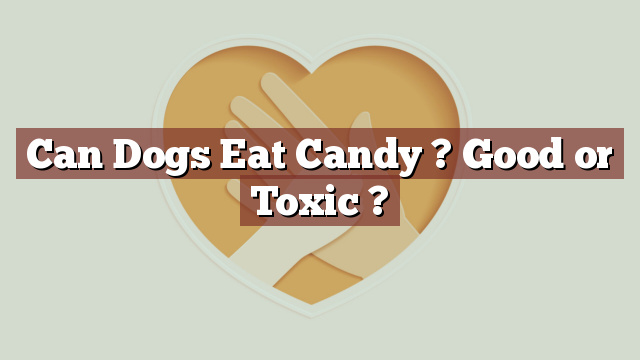Can Dogs Eat Candy? Good or Toxic?
As responsible pet owners, it is crucial to understand which foods are safe for our furry friends to consume. One such food that has raised questions among dog owners is candy. In this article, we will examine the nutritional value of candy, analyze its safety and toxicity for dogs, discuss potential risks or benefits, and provide guidance on what to do if your dog happens to ingest candy.
Nutritional Value of Candy: What Does It Offer to Dogs?
Candy, typically known for its high sugar content, is a treat that humans enjoy. However, when it comes to dogs, the nutritional value of candy is quite minimal. In fact, candy does not offer any significant health benefits for our canine companions. It is primarily composed of refined sugar, artificial flavors, and additives, which do not align with the essential nutrients dogs need to thrive.
Can Dogs Eat Candy? An Analysis of Safety and Toxicity
The answer to the question can dogs eat candy? is a resounding no. Candy can be toxic to dogs due to several reasons. Firstly, the high sugar content in candy can lead to obesity, dental issues, and even diabetes in dogs. Additionally, some types of candy contain xylitol, a sugar substitute that is extremely toxic to dogs. Xylitol can cause a rapid release of insulin in dogs, leading to a dangerous drop in blood sugar levels, liver damage, and even death.
Furthermore, certain candies may contain chocolate, another substance that is highly toxic to dogs. Chocolate contains theobromine, which dogs cannot metabolize as efficiently as humans. Ingesting even small amounts of chocolate can lead to symptoms such as vomiting, diarrhea, increased heart rate, seizures, and in severe cases, it can be fatal.
Potential Risks or Benefits of Feeding Candy to Dogs
Feeding candy to dogs can pose numerous risks to their health. The high sugar content can contribute to weight gain and obesity, which can lead to other health problems such as joint issues and heart disease. The presence of xylitol in some candies can cause serious complications, including hypoglycemia and liver failure. Additionally, the consumption of chocolate can result in symptoms ranging from mild discomfort to life-threatening emergencies.
On the other hand, there are no significant benefits of feeding candy to dogs. The risks far outweigh any potential rewards, and it is always best to prioritize their overall well-being by providing a balanced diet specifically formulated for their nutritional needs.
My Dog Ate Candy, What Should I Do? Steps to Take
If you suspect that your dog has consumed candy, it is essential to take immediate action. The first step is to assess the situation and try to determine the type and quantity of candy ingested. This information will be valuable when contacting your veterinarian. Do not induce vomiting or administer any home remedies without professional guidance.
Contact your veterinarian as soon as possible and follow their instructions. Be prepared to provide details about your dog’s symptoms, the type of candy consumed, and the quantity ingested. In severe cases, your vet may advise bringing your dog in for an examination and further treatment.
Conclusion: Candy and Dogs – A Recipe for Potential Dangers
In conclusion, it is crucial to understand that candy is not suitable for dogs. The nutritional value it offers is minimal, and the risks associated with its consumption can be severe. Candy, with its high sugar content, xylitol, and potential inclusion of chocolate, poses a significant threat to the health and well-being of our canine companions.
As responsible pet owners, it is our duty to keep harmful foods out of our dog’s reach and provide them with a balanced and appropriate diet. If you suspect your dog has consumed candy or any other potentially toxic substance, do not hesitate to contact your veterinarian for immediate guidance and assistance. Remember, your dog’s health and safety should always be our top priority.
Thank you for investing your time in exploring [page_title] on Can-Eat.org. Our goal is to provide readers like you with thorough and reliable information about various dietary topics. Each article, including [page_title], stems from diligent research and a passion for understanding the nuances of our food choices. We believe that knowledge is a vital step towards making informed and healthy decisions. However, while "[page_title]" sheds light on its specific topic, it's crucial to remember that everyone's body reacts differently to foods and dietary changes. What might be beneficial for one person could have different effects on another. Before you consider integrating suggestions or insights from "[page_title]" into your diet, it's always wise to consult with a nutritionist or healthcare professional. Their specialized knowledge ensures that you're making choices best suited to your individual health needs. As you navigate [page_title], be mindful of potential allergies, intolerances, or unique dietary requirements you may have. No singular article can capture the vast diversity of human health, and individualized guidance is invaluable. The content provided in [page_title] serves as a general guide. It is not, by any means, a substitute for personalized medical or nutritional advice. Your health should always be the top priority, and professional guidance is the best path forward. In your journey towards a balanced and nutritious lifestyle, we hope that [page_title] serves as a helpful stepping stone. Remember, informed decisions lead to healthier outcomes. Thank you for trusting Can-Eat.org. Continue exploring, learning, and prioritizing your health. Cheers to a well-informed and healthier future!

